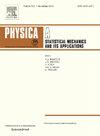二阶网络结构对链接预测的影响
IF 2.8
3区 物理与天体物理
Q2 PHYSICS, MULTIDISCIPLINARY
Physica A: Statistical Mechanics and its Applications
Pub Date : 2024-10-19
DOI:10.1016/j.physa.2024.130169
引用次数: 0
摘要
小度节点广泛存在于现实网络中,由于缺乏相关信息,导致小度节点的链接预测困难重重。聚类信息通过引入网络内部结构有利于链接预测,然而,通常讨论的一阶聚类信息对于小度节点的链接预测仍显不足。在本文中,我们引入了二阶网络结构来补充小度节点的信息。通过加入二阶聚类系数,提出了一种通用链接预测方法,并用于改进八种基线算法。实验结果表明,所有基线算法都得到了显著改进。与三种基于相似性的优势算法和两种基于学习的算法相比,改进的公共邻居方法在大多数情况下也显示出优势。此外,我们还研究了一阶网络结构和二阶网络结构之间的信息增益,发现二阶网络结构也包含丰富的信息,这为我们提出的方法提供了一种可能的理解。我们的工作可能会为网络结构如何影响链接预测带来新的启示。本文章由计算机程序翻译,如有差异,请以英文原文为准。
Effect of second-order network structure on link prediction
Small-degree nodes widely exist in real networks, causing the difficulty in link prediction for them due to the lack of information. The clustering information benefits the link prediction by introducing the network inner structure, however, the commonly discussed first-order clustering information is still insufficient for the link prediction of the small-degree nodes. In this article, we introduce the second-order network structure to complement information for the small-degree nodes. A general link prediction approach is proposed by incorporating the second-order clustering coefficient, and is employed to improve eight baseline algorithms. Experimental results show that all the baseline algorithms are remarkably improved. Compared with three advantageous similarity-based and two learning-based algorithms, an improved common neighbor method also shows an advantage in most cases. Further, an information gain between the first- and the second-order network structure is investigated, and the second-order network structure is found to also contain abundant information, which provides a possible understanding to the proposed approach. Our work may shed a new light on how network structure affects link prediction.
求助全文
通过发布文献求助,成功后即可免费获取论文全文。
去求助
来源期刊
CiteScore
7.20
自引率
9.10%
发文量
852
审稿时长
6.6 months
期刊介绍:
Physica A: Statistical Mechanics and its Applications
Recognized by the European Physical Society
Physica A publishes research in the field of statistical mechanics and its applications.
Statistical mechanics sets out to explain the behaviour of macroscopic systems by studying the statistical properties of their microscopic constituents.
Applications of the techniques of statistical mechanics are widespread, and include: applications to physical systems such as solids, liquids and gases; applications to chemical and biological systems (colloids, interfaces, complex fluids, polymers and biopolymers, cell physics); and other interdisciplinary applications to for instance biological, economical and sociological systems.

 求助内容:
求助内容: 应助结果提醒方式:
应助结果提醒方式:


